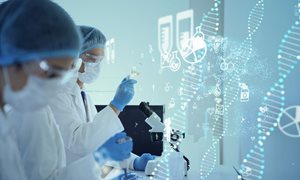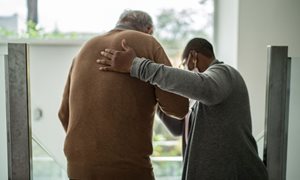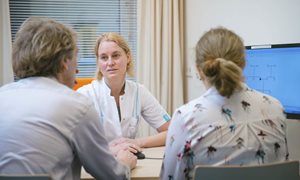
Nael Nadif Kasri has been appointed Professor of Medical Neuroscience for Neurodevelopmental Disorders at Radboud University Medical Center / Radboud University. He creates brain organoids from blood or skin cells in the lab, and works on improving this method. With these brain organoids, he studies brain development, how genetic errors lead to disorders, and what drug or therapy can help.
Sometimes a single error in DNA is the cause of impaired brain development. Neurobiologist Nael Nadif Kasri (Ettelbruck, Luxembourg, 1978) wants to better understand how such a genetic error can lead to a developmental disorder. To this end, he studies tiny brains made of brain cells, which he grows from a patient's body cells. He is monitoring the development of the cells, testing various drugs and investigating whether he can do anything about the genetic error.
Two eyes
The culturing of the brain cells is based on a fascinating method using ordinary body cells to create brain cells. 'In fact, it doesn't matter which cells from a patient you start with,' Kasri explains. 'For practical reasons, we choose cells from blood or a skin biopsy. We turn these cells into stem cells in a culture dish by adding certain substances. You can then use other stimulating substances to turn these into any cell you want, in our case brain cells.'
Kasri then further grows the cells into small structures. ‘If you put them together in a container, brain cells connect with each other and grow into a kind of mini-brain. We call that an organoid, a small imitation of an organ.' Such a brain organoid grows to a maximum of a centimeter in diameter in a warm bath full of nutrients. Sometimes the brain cells even produce retina cells, like those in your eye. You then literally see two pigmented black spheres forming on the organoid.'
Molecular tools
The advantage of the brain cultures is that they contain exactly the same DNA as the patient. This enables not only following the development of the brain in the case of a certain error in the DNA, but also testing all kinds of medications, to select the best one for the patient. In addition, Kasri is investigating whether he can repair the genetic error with molecular tools, techniques such as CRISPR CAS or antisense oligonucleotides.
In this way, Kasri is developing personalized applications for patients, currently only in clinical studies. 'I want to put a lot of effort into improving the technique in the coming years. Now we let the brain cells grow into brain cultures on their own, but this leads to a lot of variation in the growth patterns. We want to steer that process more, for example by making chips with different compartments. You can then put certain types of cells in different compartments and build artificial brains in a more targeted way.’
Brain waves
Kasri also wants to investigate whether the measurements taken on the brain cultures are predictive for the patient's brain. Kasri: 'We can measure brain activity in the organoids, using a special chip underneath the culture dish. With a large grant from ZonMW we are now going to investigate whether brain waves, measured using an EEG in a patient, show the same patterns as brain waves in the cultured brain cells.’
Once Kasri and his group have further characterized the culture technique of brain organoids and made the technique more robust, he hopes to have it applied in the clinic within five years. 'We have so far performed research in several brain disorders caused by a genetic error, such as MELAS, Kleefstra syndrome and Koolen-de Vries syndrome. But in fact we can extend our technique to many more brain disorders.'
Career
After completing a master's degree in Biochemistry at KU Leuven, Kasri earned his doctorate on his dissertation, titled: Regulation of Intracellular Ca2+-release Channels by Ca2+ and Ca2+-binding proteins. He then worked from 2005 to 2010 as a postdoc at Cold Spring Harbor Laboratory (NY, USA), where he worked for the first time with brain cells, according to Kasri ‘the most beautiful cells of the human body’. Since 2010 he has led his own research group at the Radboudumc. For his work he received large grants from ZonMW and the Simons Foundation, among others.

Colored cross section of a miniature brain. In red the nerve cells in development.
More information
For more information about Nael Nadif Kasri's research, click here.
Appointment for 5 years, starting 1 March 2022.
-
Want to know more about these subjects? Click on the buttons below for more news.
More information
Annemarie Eek

wetenschapsvoorlichter
Related news items

Dogma broken: sex differences in XLMTM mapped out Women also experience muscle symptoms due to genetic disorder X-linked MTM
6 October 2022For a long time, healthcare professionals thought that only men could suffer from XLMTM, a serious muscle disease that is inherited via the X chromosome. It now appears that women with this genetic defect are also prone to this disease.
go to page
Erno Hermans received NWO Vici grant for research on increasing stress resilience
18 March 2022 Erno Hermans, researcher at Radboudumc and Donders Institute, received a Vici grant of 1.5 million euros. With this grant, he will investigate how stress resilience is created and how it can be increased. The findings could contribute to the prevention of stress-related complaints and disorders. go to page



